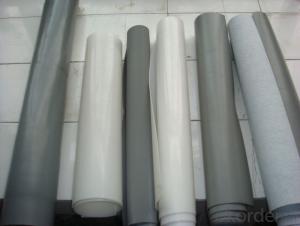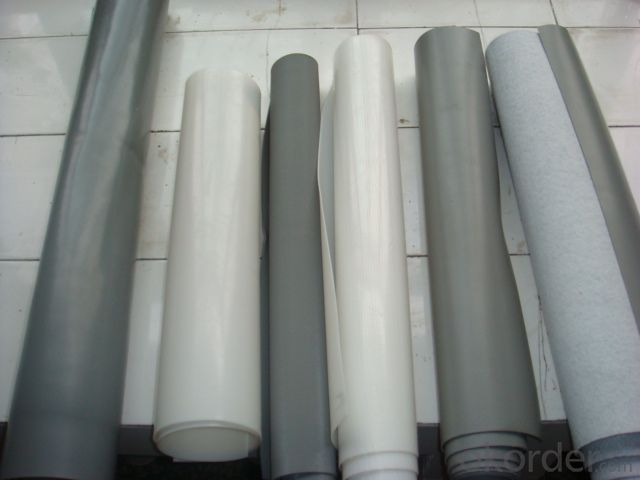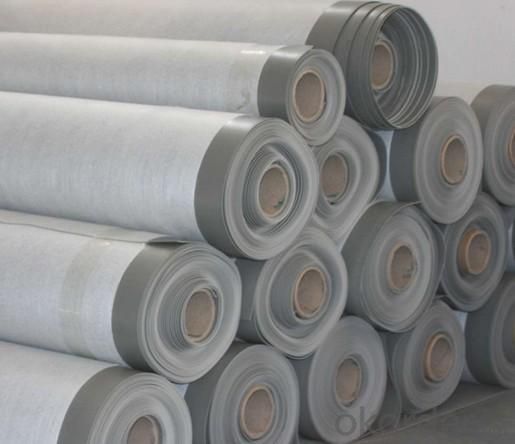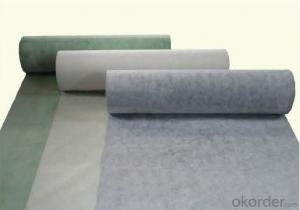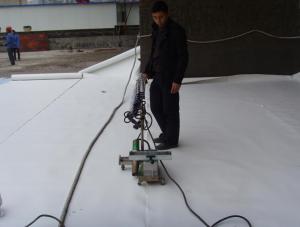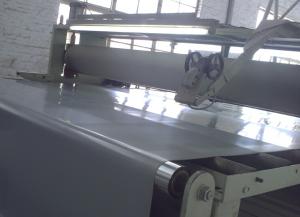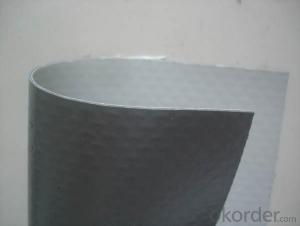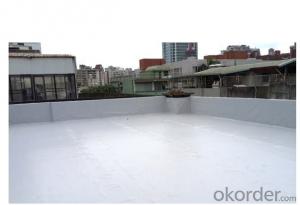PVC Roofing Waterproofing Membrane Rolls
- Loading Port:
- China main port
- Payment Terms:
- TT OR LC
- Min Order Qty:
- 5000 m²
- Supply Capability:
- 100000 m²/month
OKorder Service Pledge
OKorder Financial Service
You Might Also Like
Introduction
Polyvinyl Chloride (PVC) waterproof membrane is a new polymer waterproof membrane which is made from polyvinyl chloride resin, and mixed with plasticizer, filler, antioxygen, ultraviolet absorber and other auxiliaries.
Features
1) Excellent aging resistance. Service life of roofing material is over 20 years;
service life of underground material is over 50 years.
2) Root resistant penetration, specially used on planting roof.
3) Welding installation. Joints are solid and environment friendly, no pollution.
4) High tensile strength, good elongation and dimensional stability.
5) Good plasticity, easy and suitable for details installation.
6) Fireproof. Fire extinguished out of the ignition resource.
7) Surface is smooth, no fading and dirty resistant.
Specification
Length | 20m/roll or customized |
Width | 2.05m |
Thickness | 1.2mm; 1.5mm; 2.0mm |
Type | Homogeneous, Reinforced, Fabric back |
If Exposed | Exposed and Non-exposed |
Color | White, Grey or customized |
Applications
1) All kinds of roofs, such as steel structure roof, planted roof etc.
2) Underground engineering, such as building basement, subways, tunnels, air raid shelter, etc.
3) Other projects like artificial lake, dam, water reservoir, grain storehouse, etc.
RFQ
1. What is your MOQ?
--Our MOQ is 5000 m2
2. Can you provide sample?
--Yes, samples are in stock. we can offer free sample for you.
3. Do you offer OEM service?
--Yes, we can print customers’ logo on the packaging;
And the size and specification can be produced and design according to your demand.
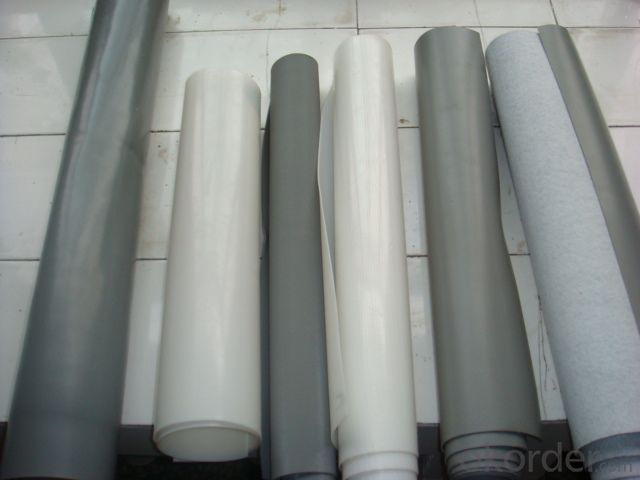
- Q: Can a waterproofing membrane be used for a planter box?
- Indeed, a planter box can benefit from the use of a waterproofing membrane. The primary function of a waterproofing membrane is to impede the intrusion of water into the surface it is applied to. Consequently, it is a suitable choice for safeguarding the planter box against moisture-induced harm. By employing a waterproofing membrane on the interior of the planter box, a barrier is established that thwarts the infiltration of water and the potential harm it may inflict upon the wood or material of the planter box. This can prove particularly advantageous when the planter box is persistently exposed to water, such as in outdoor settings or for hydroponic gardening endeavors. In essence, the utilization of a waterproofing membrane for a planter box can contribute to its longevity and ensure its sustained good condition.
- Q: Can a waterproofing membrane be used for a dam?
- Certainly! A dam can employ a waterproofing membrane, a specialized material intended to obstruct the passage of water. This membrane is commonly employed in construction to establish a barrier against water intrusion. For a dam, which is an expansive structure constructed to retain water and form a reservoir, implementing an efficient waterproofing system is crucial in preventing any water leakage or infiltration. Applying a waterproofing membrane to the dam's surface offers an additional layer of defense against water penetration. Typically composed of rubber, PVC, EPDM, or bitumen, materials known for their exceptional water resistance, the membrane is layered multiple times to ensure a sturdy and long-lasting deterrent against water. It is specifically engineered to withstand the high water pressure exerted by the reservoir held behind the dam. Utilizing a waterproofing membrane preserves the dam's integrity, guaranteeing that water does not seep through the structure and cause harm to the surrounding areas. Furthermore, it aids in impeding erosion and seepage, which can weaken the dam over time. To summarize, a waterproofing membrane is indeed a viable solution for a dam, offering an effective means to ensure the dam remains watertight and structurally stable.
- Q: Can a waterproofing membrane be applied to uneven surfaces?
- Yes, a waterproofing membrane can be applied to uneven surfaces. However, it is important to properly prepare the surface by leveling or smoothing it out to ensure the membrane adheres correctly and provides effective waterproofing.
- Q: Can a waterproofing membrane be used for a hospital?
- Yes, a waterproofing membrane can be used for a hospital. Waterproofing membranes are commonly used in hospitals to prevent water infiltration and protect the building from water-related damages. They are especially useful in areas with high moisture levels such as bathrooms, basements, and roofs. By installing a waterproofing membrane, hospitals can ensure a dry and safe environment for both patients and staff, reducing the risk of mold, mildew, and structural deterioration caused by water damage.
- Q: Can a waterproofing membrane be used for a balcony deck?
- Yes, a waterproofing membrane can be used for a balcony deck. Waterproofing membranes are specially designed to create a barrier against water penetration, which is essential for protecting structures such as balcony decks from moisture damage.
- Q: Are there any specific maintenance requirements for a waterproofing membrane?
- Yes, there are specific maintenance requirements for a waterproofing membrane. Regular inspections should be conducted to check for any signs of damage or deterioration, such as cracks or leaks. Any debris or standing water should be promptly removed to prevent potential damage. Additionally, it is important to follow the manufacturer's guidelines for cleaning and maintenance, which may include periodic cleaning with mild detergents and avoiding the use of harsh chemicals or abrasive cleaning tools.
- Q: Can a waterproofing membrane be used on concrete tanks?
- Concrete tanks can indeed benefit from the use of a waterproofing membrane. The primary purpose of this membrane is to create a barrier that prevents water from penetrating through. It is specifically designed to be applied on various surfaces, including concrete. Waterproofing membranes are especially useful for concrete tanks that are used for water storage or containment. By applying the membrane on the concrete surface, a protective layer is formed that effectively stops water from entering or exiting the tank. This is crucial for maintaining the tank's structural integrity and avoiding any potential damage or contamination caused by water leakage. Furthermore, these membranes also offer protection against other substances that may be present in the tank, such as chemicals or pollutants. It is important to choose the right type of membrane that suits the specific requirements of the concrete tank. Following the manufacturer's instructions for application is also essential to ensure that the waterproofing is effective and long-lasting.
- Q: Can a waterproofing membrane be used for plaza decks?
- Yes, a waterproofing membrane can be used for plaza decks. Waterproofing membranes are commonly used in construction to prevent water infiltration and protect the underlying structure. Plaza decks are outdoor spaces that require protection against water damage, making waterproofing membranes an ideal solution to ensure the longevity and durability of the deck.
- Q: Can a waterproofing membrane be used in chemical or hazardous environments?
- Yes, a waterproofing membrane can be used in chemical or hazardous environments. Waterproofing membranes are designed to provide a barrier against water, moisture, and other liquids, which can also include chemicals and hazardous substances. These membranes are typically made of materials that are resistant to chemicals, such as polyurethane, PVC, or modified bitumen, to ensure they can withstand exposure to various chemicals without being damaged or compromised. However, it is important to select a waterproofing membrane specifically designed for chemical or hazardous environments to ensure it meets the necessary requirements and standards for such applications. Additionally, proper installation and maintenance are crucial to ensure the effectiveness and longevity of the waterproofing membrane in these environments.
- Q: How does a waterproofing membrane handle soil movement and settlement?
- A waterproofing membrane is designed to handle soil movement and settlement in several ways. Firstly, it acts as a barrier between the soil and the structure, preventing water intrusion and reducing the impact of soil movement on the building. One way it deals with soil movement is by providing flexibility and elasticity. This allows the membrane to accommodate minor soil shifts and settlements without cracking or tearing. By flexing along with the movement, it maintains its integrity and continues to provide a waterproof seal. Additionally, a waterproofing membrane is often reinforced with materials such as polyester or fiberglass, which enhance its strength and resistance to soil movement. These reinforcements help distribute the stress caused by soil settlement over a larger area, reducing the risk of damage to the membrane. Another important aspect is the installation of the membrane. It should be properly anchored and secured to the structure, ensuring that it remains in place even when the surrounding soil moves. This prevents the membrane from shifting or pulling away, which could compromise its effectiveness and lead to water infiltration. Furthermore, some waterproofing membranes also have self-healing properties. This means that if the membrane is punctured or damaged due to soil movement, it can automatically seal the breach to prevent water from entering. This self-repairing ability provides an added layer of protection against soil-induced damage. Overall, a properly installed and maintained waterproofing membrane is designed to withstand soil movement and settlement. By being flexible, reinforced, securely anchored, and possibly self-healing, it can effectively handle these challenges and maintain its waterproofing capabilities for an extended period of time.
Send your message to us
PVC Roofing Waterproofing Membrane Rolls
- Loading Port:
- China main port
- Payment Terms:
- TT OR LC
- Min Order Qty:
- 5000 m²
- Supply Capability:
- 100000 m²/month
OKorder Service Pledge
OKorder Financial Service
Similar products
Hot products
Hot Searches
Related keywords
